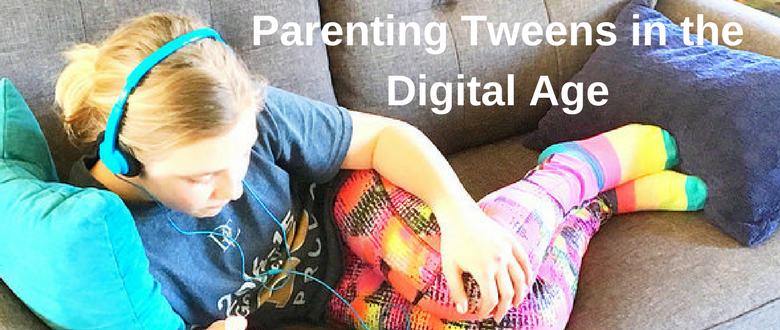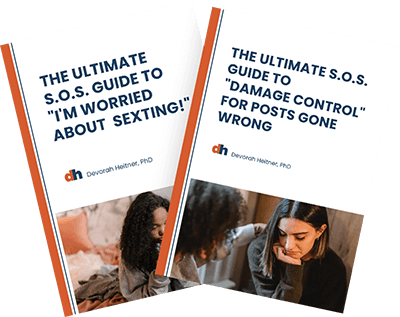Parenting tweens gets a bad rap. In my work helping parents and schools with kids and social media, I hear a lot of complaining about kids between 9 and 13 “growing up too fast,” being “immature” or “distracted.” My digital citizenship workshops with kids this age have given me a window into their creativity and generosity. That being said, it can be difficult for parents and educators to balance their burgeoning need for autonomy with residual kid-like behavior.
Nine to thirteen year olds are moving through huge changes in their physical, cognitive emotional and social development. They are starting to form their own identities, trying on new personae and testing boundaries every day. If you have a 6th grader in your house right now, you know exactly what I’m talking about. Kids may change their hairstyles and extracurricular pursuits to align with new identities at this age.
While this search for identity is not a new phenomenon, social media has added a confounding layer on top of an already intense and complicated time. To start, their potential audience is wider. This translates into more feedback—or at least the impression of more feedback. As our kids start using in social media, we need to make sure they are not “crowdsourcing” their identity and quantifying their popularity through the pursuit of “likes.” How can we do this?
Some kids start out independent, but become more conformist in middle school as a way to fit into the sometimes harsh social expectations that begin to accrue. Other kids have been trying to fit in forever and tend to “follow the crowd.”
As best you can, try to resist your own judgement about your child’s conformity (or nonconformity) and, instead, help them to see it for themselves. You want your child to feel confident about her choices. As parents, we can agree that we don’t want our daughter to give up ice hockey, if she loves it, just because a lot of her female friends are gravitating towards gymnastics. On the other hand, if she then wants the exact same headband as her friends, try to resist judgment there, too.
6 Strategies for Parenting Tweens
1) They want you to think well of them. They want to know that you respect them and like them and are hurt if you think poorly of them. Even if they seem to be trying to provoke a low opinion of themselves. Use this to your advantage! Be careful about what you say about them on social media or out loud when you think they can’t hear you. You may need to vent about their behavior, but be really careful about doing it in ways that won’t get back to them. By this age, it is crucial to always ask permission before you share pictures of them, or updates about them on social media. This is a great way to build trust, honor their privacy and teach them healthy boundaries about posting on social media.
2) It is very typical for kids to sometimes complain about you. So if you read their texts… you may see some moaning and groaning. Be careful about not overreacting to this! This is one of the many hazards of digitally spying on kids, especially without their knowledge. Think carefully about your motivations.
3) On the other hand, by this age, many kids know enough about their friends’ families to appreciate their own. They talk about their parents with one another. Your kid may talk about how she envies some of her friends’ families, but she also probably knows enough about some of her peer’s families to be grateful she has you. The families that seem to have few or no rules for their kids’ behavior may seem less appealing to your child as she gets to know them. Differing rules about social media, curfews, or other boundaries will provoke some important conversations with your tween.
4) They want their friends to really know and understand them, but they don’t always totally understand themselves. Friendship is really tough at this age. Many kids go through relationship turmoil. Small problems can become big problems, and texting can turn up the dial on misunderstandings. It is easy to focus on feeling left out and social media can make it painfully visible and public. It is one thing to learn about something you missed after the fact; it is even more painful to watch photos posted in real time by kids who are at a party or get-together that is taking place without you.
5) Sometimes tweens wish they were still little kids – even though they are all about talking about how they don’t want to be treated like a little kid. And they don’t! Except when they do. Don’t remark on this, just accept those times they want to be close. This is a time in your kid’s life to accept that you may be their ‘B’ plan if they don’t get invited to something cooler. If you can embrace being the fallback plan without complaint, you might end up having a really fun afternoon or evening with a great kid that you know and love.
6) Tweens need reasonable and consistent limits. Your presence gives them an excuse to say no to stuff that freaks them out. For example: “Stop sending me those pictures. My dad looks at my phone and I’ll be in BIG trouble.” Your child will push back. That is their job. Your job is to stay consistent, and to look ahead to greater independence and different limits. Small areas of independence may be very important to your tween, so finding the places where you can give them space to increase independence and self-reliance is also important. You don’t have to read all of your child’s texts for him to use you as a guardrail with peers to set a boundary.
Ultimately, as parents, we need to give our kids freedom and let them take risks. We should also be keeping an eye on mental health indicators at this age. Don’t be afraid to seek out therapy for your child or for yourself as you navigate these years. Find ways to support yourself that include face to face time with other parents who are navigating these challenging years with you.
My Favorite Books on Parenting Tweens
This is a sampling of a few of my favorites books on parenting tweens for moms and dads grappling with this challenging stage. All of these books have expert reviews, but I wanted to share reviews from parents who read the books and were moved to respond in their own words.
Michelle Icard’s Middle School Makeover: Improving the Way You and Your Child Experience the Middle School Years
The humor and real world advice in this book have helped many families navigate these challenging years. Also check out Icard’s social leadership curricula for boys and girls. Whether you are parenting tweens (girl or boy), this book has amazing wisdom that will help you.
“Middle school years probably rank second after the birth of your first child in making parents feel the most inept and clumsy. Michelle Icard’s book is an easy to read, fun road map for navigating some of the potholes in life with a middle schooler. Not only do I have a copy, but I gave copies to my child’s MS teachers and principal! The practical tips and humor make this parent feel like I just might survive it all! I’m keeping it on my bedside table because the author’s guidelines about how to talk to your middle schooler are a huge help. GREAT BOOK.”
–(Amazon review)
Jessica Lahey’s The Gift of Failure: How the Best Parents Let Go So Their Children Can Succeed
This book is compelling and transformative reading for parents with kids of all ages. You’ll want to revisit or get to know this book during the tween years.
“I loved this book so much! It puts into play the same motivation and willpower adults use to get through a difficult task. She gives practical advice on how to teach kids to rebound, so they can gain the confidence and grit to survive failures. On page 206 she states: “Kids learn the most about sticking with a task when it’s hard, whey they are sure they will never figure something out, or when they are suffering the consequences of their own procrastination or botched planning.” In the day and age of helicopter parenting and “a trophy for participation” she promotes the age old advice of “learning from your mistakes.” For anyone with kids or working with children this is a book you must have on your bookshelf!”
–(Patricia Wooster on Amazon)
Deborah Roffman’s Talk to Me First: Everything You Need to Know to Become Your Kids’ “Go-To” Person about Sex
You will also want to get your tween a good book or two of their own about puberty and sexuality, but this is one my favorite books on this topic for parenting tweens.
“I thought this was about how to have “the talk” with your kids but it turns out this is so much more. This is a parenting book with a reminder that good parenting doesn’t go out the window when sex is involved. At first I was uncomfortable with some of what she was saying — terminology, especially — but, by the end, I was convinced that Deborah Roffman has good ideas and can help parents find a path forward in helping parents prepare kids for — and defend them from — today’s over-sexualized world. Even if this makes you squeamish, you owe it to your kids to break through and get over it. I loved this book and can’t recommend it highly enough.”
–(Amazon review)
I’ll also mention my own book: Screenwise: Helping Kids Thrive and Survive in Their Digital World
“Until I read this book I was of the mindset that the longer I could limit my kids’ entry into the online/digital space, the better. Now I realize how much fear and misunderstanding was behind that philosophy, and I can’t say enough great things about this book. Heitner walks parents gently through the process of becoming “tech-positive”–which doesn’t mean we have to permit and allow it all, but rather that we see the many benefits of technology and stop reacting from a place of fear and control. The book has concrete tips for “mentoring” kids from school-age to teen as they begin to use texting, social media, online gaming, and more, and reassures parents that we don’t have to be an expert at every new app in order to help our kids navigate the social and emotional challenges that these avenues bring up. I’m still a rather tech-cautious parents, but now I’m all in for experiencing technology WITH my kids, instead of trying to shield them from it. Highly recommend for parents of preschoolers through teens.”
–(Sarah on Amazon)
PS: Would you like informative posts like this in your inbox? Along with occasional updates and offers? Sign up here!
Photo credit: “Tween” by David Mulder is licensed under CC BY 2.0. Changed from original: Added text overlays.
Hit the reset button on your family’s digital life!
Sign up below for 7 days of actionable strategies, right in your inbox.

